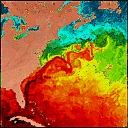
Ocean water and currents affect climate §. Because it takes far more energy to change the temperature of water than land or air, water warms up and cools off much more slowly than either. As a result, inland climates are subject to more extreme temperature ranges than coastal climates, which are insulated by nearby water.
Over half the heat that reaches the earth from the sun is absorbed by the ocean's surface layer, so surface currents move lots of heat. Currents that originate near the equator are warm; currents that flow from the poles are cold.

Highs and lows, coastal vs. inland §
(low) (high) (*N)
City Jan July latitude
1) Los Angeles 64*F 81*F 34.0
18*C 27*C
2) Little Rock 50*F 90*F 34.5
10*C 32*C
3) Seattle 4*F 72*F 47.5
7*C 22*C
4) Bismarck 18*F 82*F 47.0
-8*C 28*C
5) London 45*F 73*F 51.5
7*C 23*C
6) Warsaw 32*F 75*F 52.5
7*C 24*F
7) Belfast 43*F 64*F 54.0
6*C 18*C
8) Moscow 16*F 73*F 56.0
-9*C 23*C
9) Tokyo 46*F 82*F 35.0
8*C 28*C
10) Kabul 36*F 88*F 35.0
2*C 31*C
11) Beirut 63*F 90*F 34.0
17*C 32*C
Why is snow rare in London but common in Boston? When the warm
Gulf Stream moves Caribbean heat to the North Atlantic, the water
cools and releases a tremendous amount of heat into the
atmosphere. Winds blowing west to east carry this moist warmth
toward Europe §.
![]()

The Gulf Stream as drawn by Benjamin Franklin (left) and a satellite-derived sea surface temperature map of the Gulf Stream (right)
London (latitude 51.5 degrees North)
average annual precipitation - 23.8 inches (60.4 cm)
record snowfall - 8 inches (20 cm) during one day, March 1947
Boston (latitude 42.3 degrees North)
average annual precipitation - 43.8 inches (111 cm)
record snowfall - 23.6 inches (60 cm) during one day, February
1978
![]() Ocean Planet Exhibition Floorplan
Ocean Planet Exhibition Floorplan
![]()
Judith Gradwohl, Smithsonian Institution (Curator/Ocean Planet)